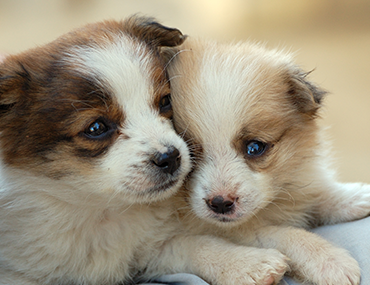OK, so you just came home with the cutest, cuddliest, and most beautiful puppy. Now what?
The first and most important thing to do with a new puppy is to begin a routine, and central to that routine will be getting your bundle of joy house trained. As much as you love your new puppy, you won’t love finding mistakes and accidents around every corner. It can seem daunting, but a few key strategies will help you get your pet on the right track to being a well-mannered member of the household!
Eliminate the chance for accidents.
In the early days with your new puppy, you want to avoid the chance for “accidents” to happen. If you never give your puppy the chance to go to the bathroom in your house, he or she won’t even think it’s an option. This means you are going to be taking your puppy outside a lot — and we mean a lot. Puppies pass food and water extremely quickly, and any excitement or activity makes ithappen even faster.
We recommend taking your puppy out every 30 minutes — he or she will definitely need to go. Each time you go out, go to the same spot, use a word that you want to attach to the idea of “going” (potty, pee pee, or even just “go”) and say it a few times. When your puppy relieves him or herself, go crazy with praise, including plenty of “good dogs” and patting and positive reinforcement. Give a treat if your puppy is very food motivated. Then go right back in the house — you want your dog to realize that these trips are for “business.”
As your puppy gets older, you can extend the time between trips outside. You’ll eventually recognize the signs that say “mom and dad, I have to go!”
Get your pooch on a schedule.
We all need a schedule and puppies are no exception. Feed him or her at the same times each day (young puppies will eat multiple times per day, based on your veterinarian’s advice). Walk your puppy within 15-20 minutes of eating, as described above. Don’t vary from the schedule if possible — your puppy will get into the groove very quickly.
Confine your puppy when you aren’t available to supervise.
Puppies need eyes on them at all times. When you're not around, a crate is a great alternative to letting your puppy wander around and get into trouble You can read our article about crate training to learn more. Appropriately sized crates are great because dogs generally don’t like to go to the bathroom where they sleep and even young dogs can usually “hold it” overnight once they’re used to the crate. If your puppy has trouble with this, give the last meal and water a couple of hours before bedtime. Also, don’t leave your puppy in the crate for more than four hours at a time (yep, that means just like with a human baby, you probably will have some overnight walking to do, especially when your puppy is just a couple of months old).

Clean, clean, clean.
Your puppy will make some mistakes and you want to ensure that you clean the affected areas thoroughly. Dogs have an incredible sense of smell, so it is best to eliminate odors so they don’t think it’s an acceptable place to do their business. Regular household cleaners won’t do the trick, either. You’ll need an enzymatic cleaner or something specifically designed to remove the smell of urine and feces. Ask your veterinarian for product recommendations.
Reward good behavior, but don’t punish mistakes.
A puppy can’t help going to the bathroom in the house any more than a baby can help going in a diaper. Just like a mom or dad need to change a baby’s diaper frequently, pet parents need toensure their canine baby has adequate opportunities to go outside.
Only correct your dog when you actually catch him or her the act, and when you do, tell your puppy “no” firmly but not angrily. Then take your puppy outside to take care of business. Never get angry or punish a puppy for an accident. Also, don’t reprimand a puppy for something that happened more than a minute in the past because it will just confuse them.
Even a well-trained dog might have the occasional accident triggered by excitement (meeting new people) or fear (thunder, other loud noises). If this happens with a trained older dog, do the same thing as you would with a puppy: firmly say “no” and take your dog outside. If you think your trained dog is having an unusual number of accidents, it could be due to an underlying medical issue and you should talk to your veterinarian.
If you've been patient but your pup is still peeing on the floor click here to learn about urinary incontinence.
If you have any questions or concerns, you should always visit or call your veterinarian – they are your best resource to ensure the health and well-being of your pets.
